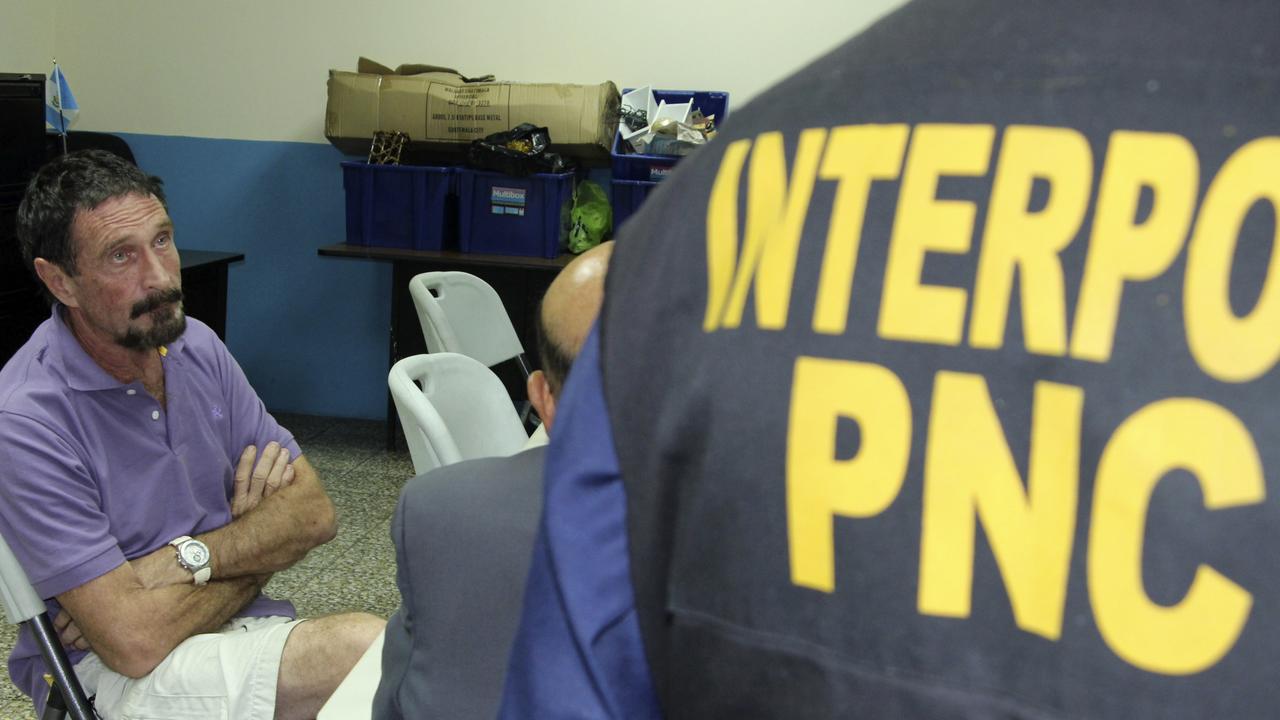John McAfee says Jeffrey Epstein didn’t commit suicide
Sex, gun and drug-fuelled antivirus mogul John McAfee is on the run again — months after a court found him liable for “torture and murder”.
John McAfee doesn’t believe Jeffrey Epstein killed himself.
But the antivirus software creator, murder suspect, international fugitive and 2020 presidential candidate has denied an internet conspiracy theory that he is on a mission to take down the “deep state”.
McAfee, who has been on the run from US authorities on his yacht since January and claims the CIA “has attempted to collect us”, spoke to news.com.au on Wednesday from an undisclosed location inside a “communications Faraday cage with signal jammers and multiple VPNs”.
“I can’t tell you where I am,” the 74-year-old said via a barely working phone connection ahead of a planned video-link appearance at the StartCon event in Sydney later this month. “I cannot do that. We carry no telephones with us anymore, we carry no electronics.”
The CIA has attempted to collect us. We are at sea now and will report more soon. I will continue to be dark for the next few days. pic.twitter.com/o79zsbxISl
— John McAfee (@officialmcafee) July 19, 2019
In July, some internet users became convinced McAfee was behind a mysterious YouTube account posting high-quality drone footage of Epstein’s private Caribbean island.
Asked to comment, McAfee said, “No, I can’t talk about that at all.” But the notoriously paranoid entrepreneur believes it’s not possible the billionaire paedophile died by suicide.
“The man was six-foot-one, he hung himself from a bed that was only five-foot-seven in a manner that managed to break his neck in multiple places similar to someone being physically strangled,” he said.
“His cellmate was taken from his cell six hours before his death, the video cameras were off and the guards in that cell block were sent home early due to cleaning. You add all that stuff up, and I don’t see how a suicide is possible.”
He added, “Keep in mind Jeffrey Epstein had surveillance gear on that island. It would not be beyond belief to think that he might have kept recordings of whatever activities were happening on the island and people found out about it. It’s not something that politicians and people in power would like to have known — so it could be any one of hundreds of people or all of them acting together.”

McAfee created the pioneering antivirus software bearing his name before selling out in the early 1990s, netting him a reported $US100 million.
After the global financial crisis he told The New York Times he had lost all but $US4 million of his fortune — although he later denied that figure.
In 2009, he liquidated his assets and retreated to a heavily fortified beachfront compound on Ambergris Caye, a remote island off the coast of the Central American nation of Belize.
His paranoid, sex and drug-fuelled, jungle-dwelling lifestyle drew comparisons to Colonel Kurtz from Joseph Conrad’s Heart of Darkness. He kept a harem of local prostitutes and never went anywhere without gun-toting bodyguards.
McAfee’s legal troubles first started in 2012 when Belize police raided his mansion under suspicion he was running a meth lab, although no drugs were found.
Seven months later, he was named as a person of interest in the murder of his neighbour, American expat Gregory Faull, who was found dead from a gunshot to the head after reportedly poisoning McAfee’s dogs.
McAfee denied any involvement but went on the run, claiming Belize authorities — in the pocket of Mexican drug cartels — were trying to kill him. He was arrested several weeks later in Guatemala, where he unsuccessfully applied for asylum before ultimately being released and deported to the US.

He ran as a candidate for the Libertarian party in 2016 and last year announced he would run again in 2020, “this time to draw public attention to the blockchain and cryptocurrency revolution”.
In January this year, he fled America by boat, claiming he was being pursued by the Internal Revenue Service for tax evasion after not filing tax returns for eight years. He vowed to run his presidential campaign from “in exile”.
In July, he was detained by authorities in the Dominican Republic for several days while his yacht was docked in Puerto Plata, with officials saying they suspected McAfee and his companions of carrying high-calibre weapons, ammunition and military-style gear.
In March, a Florida court ordered McAfee pay $US25 million ($A36.2 million) for the “torture and murder” of his former neighbour in a wrongful-death suit brought by Mr Faull’s daughter. McAfee refuses to pay and says he has no assets anyway.
“That was a civil case — I’ve had over 200 lawsuits — any time someone came onto my property and fell or whatever, another lawsuit,” he said. “I never bother anymore to even respond, so it’s what’s called a default judgment. In other words, the judge just accepted whatever the plaintiff said. It’s all the same. I pay no attention.”
McAfee admits he has “no chance of being president” and he “wouldn’t want the job if you paid me” — but “by doing so I get access to the national stage to get my message out”.

He says the biggest threat to freedom is surveillance. “Our covert agencies, the CIA, NSA, FBI, the way things used to run is you had a suspect, went to court, got a subpoena to tap their phone or read their emails,” he said.
“It’s now reached a point where almost everybody is surveilled just because all the data helps the enforcement agencies to pick up bad guys — but at what cost? It’s costing us our privacy, and without privacy you can’t have (freedom). This is the number one problem in America, and from what I’ve seen of the rest of the world, this is becoming the number one problem everywhere.”
McAfee doesn’t foresee returning to the US any time soon. “Barring a presidential pardon, I think the political environment in America is going to have to change,” he said.
“I think that more and more people are becoming upset at income taxes that are unconstitutional. That’s what I’m charged with, income tax fraud. As a libertarian we believe income taxes are illegal, and I just don’t pay them. Until I started talking about cryptocurrencies, however, and how cryptocurrency can relieve you of an overburdening government and financial institutions, that’s when they (convened) their grand jury. They’re trying to shut me up.”

Asked for his assessment of US President Donald Trump, McAfee says he doesn’t believe “who sits in the president’s office makes any difference at all”.
“When a president (comes in), the covert agencies, the CIA, NSA, Secret Service, army intelligence, sit the president down and explain what the world is,” he said.
“You think they tell the president everything? No, they see the president as somebody who’s insignificant. He’ll sit there for four years, and they need to keep him quiet and entertained and give him something to do. America is not ruled by presidents, America’s ruled by our covert agencies. This is an absolute fact.”
He likened it to “1939 Germany, Nazism, the SS”. “Whether Trump is doing a good job or not — to me, is he doing any job?” he said.
“Has there ever been a president who promised anything big and did anything big? Why? Not because they didn’t want to do it, but because they sat down in the chair and realised they don’t have the power to do what they want. They are given limited power by their controllers and advisers who they depend on.”
Despite being plagued by scandal, McAfee is billed as a headline speaker at the tech conference on November 22-23 alongside the likes of former prime minister Malcolm Turnbull.
Organisers describe him as a “lifelong advocate of personal freedom” who “now applies his passion, energy and vision to evangelising blockchain and cryptocurrency adoption” and “uses his reach to encourage individuals to look beyond investing at all of the positive social change made possible by the blockchain”.
At StartCon, McAfee will “discuss topics of freedom, privacy and technology including cryptocurrency, computer security, blockchain and his new decentralised currency exchange McAfeeDex”.




